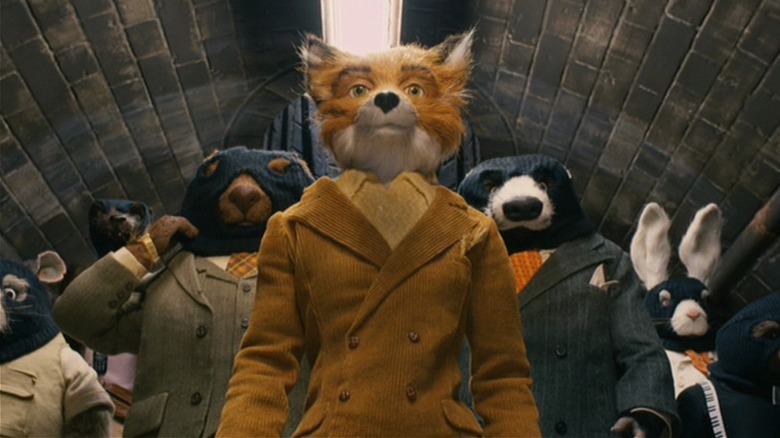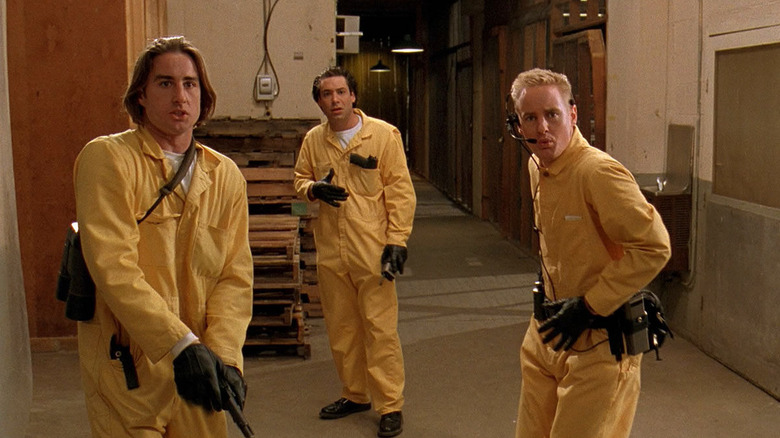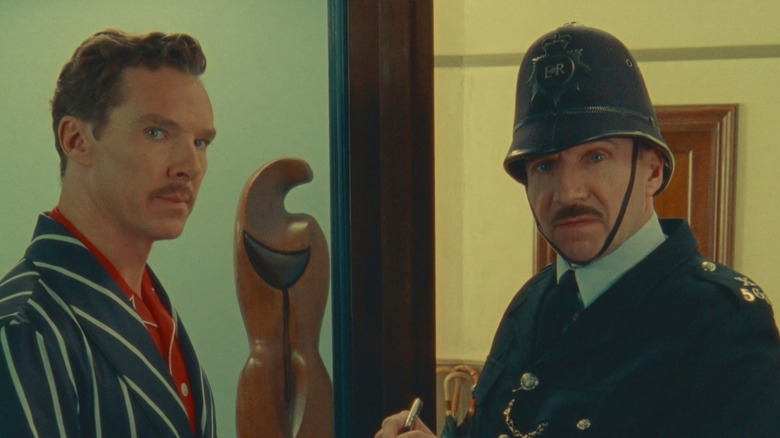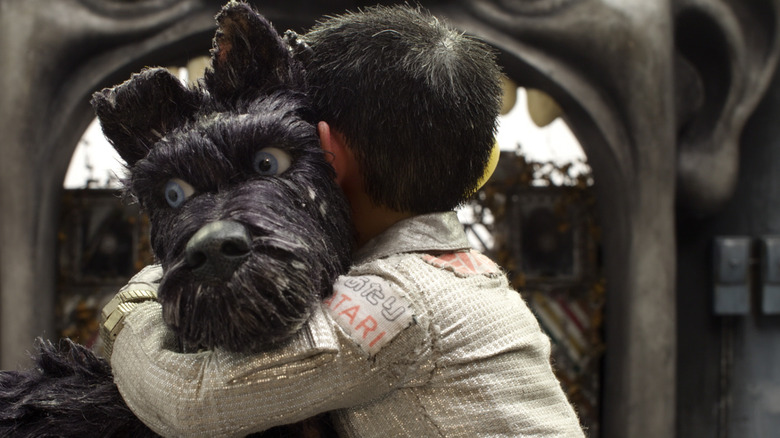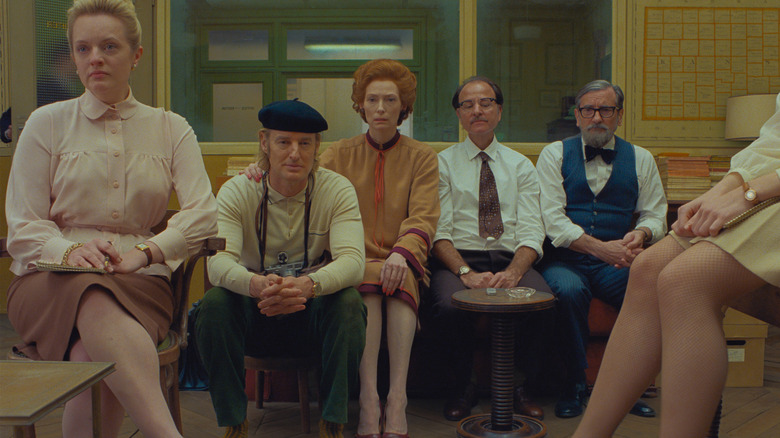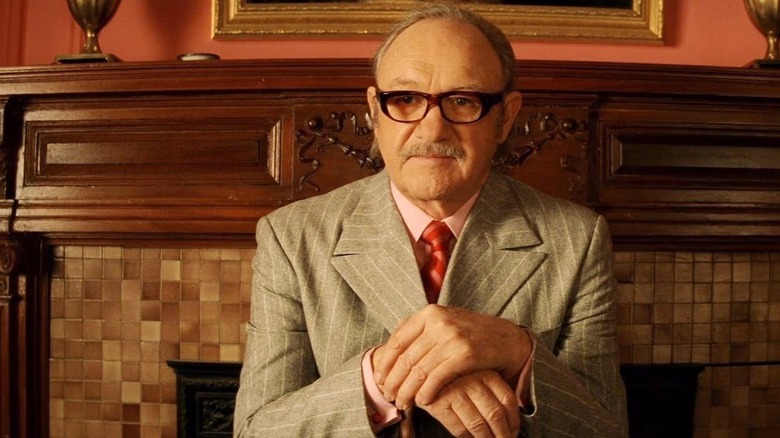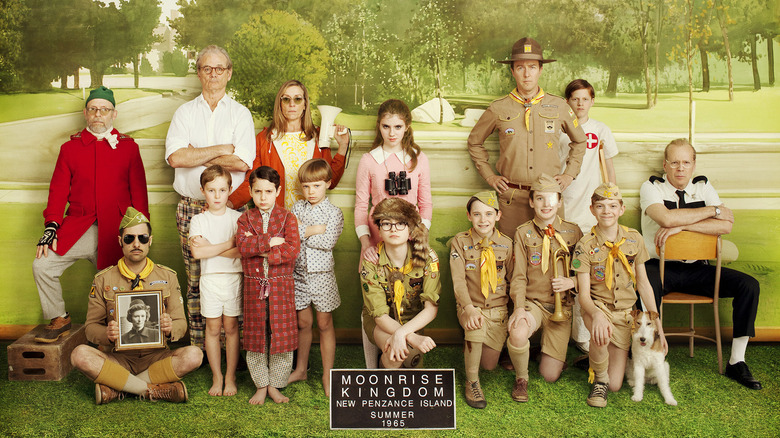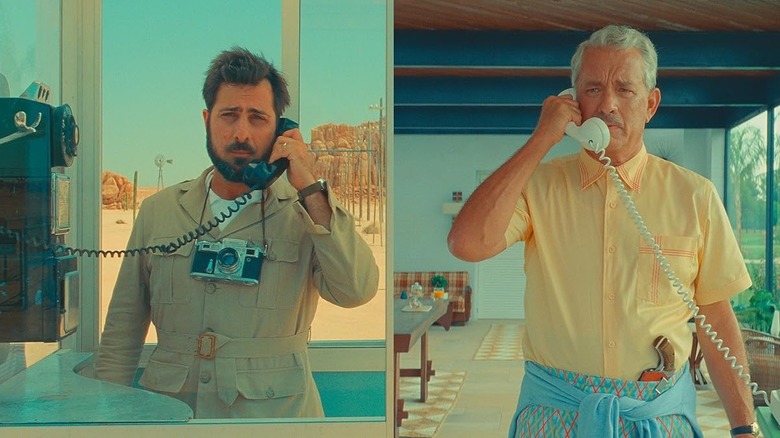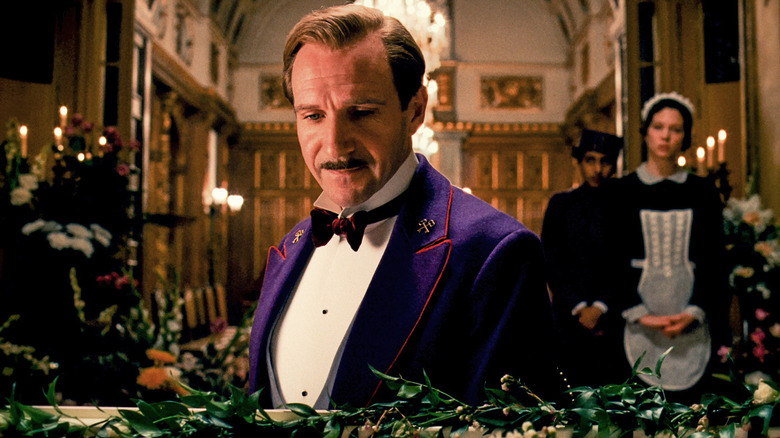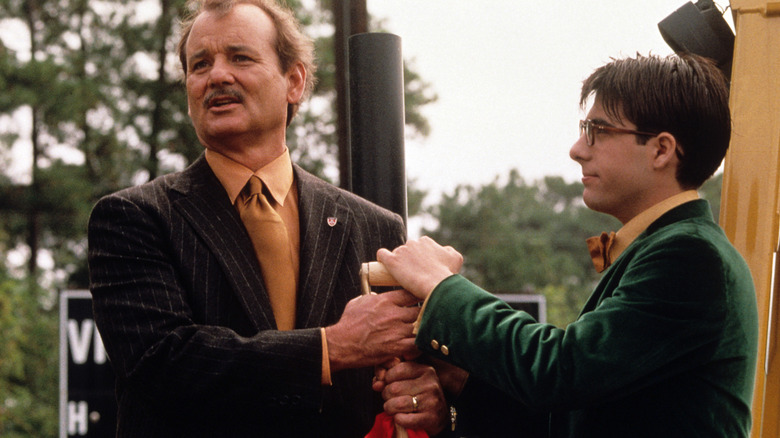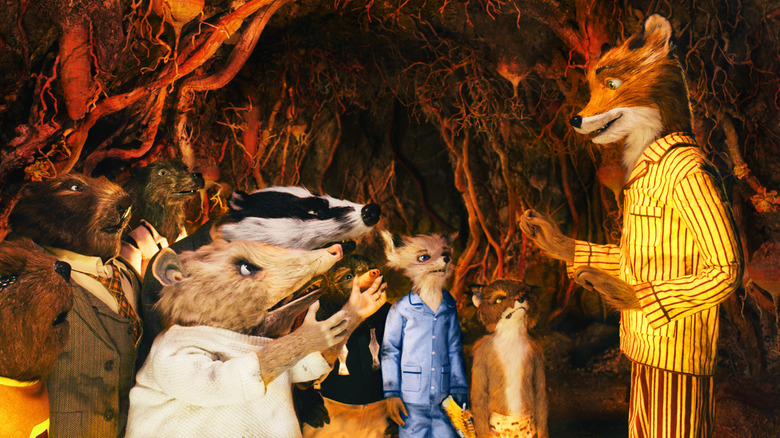The 10 Best Wes Anderson Movies Ranked
The internet has a bad habit of boiling down Wes Anderson's works to a couple of surface-level visuals or terrible A.I.-generated "parodies" of his work. In reality, Anderson's filmography is far more complicated than just characters staring down the camera or colorful sets. This filmmaker is a master of many things, but he's especially graceful in imbuing fanciful visuals with raw examinations of everyday life's greatest struggles. Whether it's a stop-motion fox or the Tenenbaum family, Anderson's characters grapple with genuinely tremendous internal obstacles, such as self-hatred, jagged familial dynamics, or trauma from war. The unforgettable idiosyncratic visuals of his works suggest that turmoil and angst can exist anywhere, even in an "Isle of Dogs" or "Grand Budapest Hotel."
There are many ways to appreciate this director's endless accomplishments, including finding the virtues in even Wes Anderson's "worst" film. One especially stimulating way, though, is to absorb his ten greatest motion pictures. Looking at these ten movies, ranked below from "worst" to best, one begins to appreciate how versatile Anderson truly is as a director. Recurring themes, visual motifs, and pop culture fascinations do seep into his work, like with any other auteur. However, these ten outstanding films especially encapsulate the balance of comedy and vulnerability that makes his works so special in the history of cinema. Settle for the internet's half-hearted vision of what Wes Anderson features "look like" if you dare. His ten best movies far more interestingly dive into why the world's obsessed with this man's filmography.
10. Bottle Rocket
Wes Anderson's creative hands were still a little shaky on his feature-length directorial debut "Bottle Rocket." That's obvious just in the production design alone. How strange to see an Anderson movie set against discernible ordinary Dallas backdrops rather than the grandiose colorful sets that would dominate his later works! However, "Bottle Rocket" is also a fascinating indication that Anderson had already figured out some of his great creative fascinations, including actors he got along with exceedingly well. Go-to Anderson performer Owen Wilson serves as one of "Bottle Rocket's" leads, with recurring Anderson performer Luke Wilson playing the film's other protagonist. Owen Wilson, in one of his best on-screen performances, portrays Dignan with a rigid adherence to schedules echoing other later Anderson protaganists and their deeply precise fascinations.
A fixture of Anderon's work that's especially palpable here is this filmmaker's melancholy streak. "Bottle Rocket" is a film about clunky criminals constantly in over their heads. They have grand ambitions stretching out for 75 years of existence that include heists and senses of joy that can never come to fruition. Even by the end of the film, an incarcerated Dignan is still clinging to hopes for efficient and effective law-breaking that will never materialize. Like Anderson's best films, "Bottle Rocket" is ultimately a bittersweet cinematic exercise punctuated with bursts of dark comedy. His later films would be unquestionably more polished. However, Anderson's command of tone, visual humor, and actors were already fully perceptible in those early days of "Bottle Rocket."
9. The Wonderful Story of Henry Sugar and Three More
In 2023, Wes Anderson devotees didn't just get to experience "Asteroid City." They also indulged in Anderson's quartet of Roald Dahl short story adaptations that were eventually compiled into a single anthology film on Netflix entitled "The Wonderful Story of Henry Sugar and Three More." In the confines of a single 88-minute production, these four short films make for a remarkable experience. For one thing, experienced in an uninterrupted fashion, Anderson's tonal variety is astonishing across all four productions. Whether it's the horror film vibes of "The Rat Catcher," the aching tragedy of "The Swan," or the whimsical humor of "The Wonderful Story of Henry Sugar," Anderson keeps his craft intact. His talent never wavers across these four projects.
Within an anthology film, it's similarly extra impressive to witness the versatility of the actors Anderson's assembled. Folks Benedict Cumberbatch, Dev Patel, Ralph Fiennes, and others also get to inhabit a slew of different figures across the four yarns to winning effect. Fiennes, for his part, effortlessly portrays a warm inviting narrator in "Henry Sugar" before becoming an eerie, unnerving figure in something like "The Rat Catcher." What enthralling range! Plus, it's just dynamite to see individuals like Ayoade finally make their way into the world of Wes Anderson! 14 years after this filmmaker wove cinematic magic out of bringing Dahl's "Fantastic Mr. Fox" to the big screen, this director once again excels in adapting Dahl's words with "Henry Sugar's" various tales.
8. Isle of Dogs
Nine years after "Fantastic Mr. Fox," Wes Anderson returned to the world of animated cinema with "Isle of Dogs." This time, instead of adapting a Roald Dahl children's book, Anderson set his sights on an original story about dogs being isolated to a trash island in Japan. The plot follows a ragtag group of pooches led by Chief (Bryan Cranston) who are all trying to navigate this tumultuous world and help a lost 12-year-old named Atari find his way home. What follows isn't one of Anderson's deepest films, particularly in its sometimes surface-level approach to Japanese society. However, it's unquestionably one of his most visually extraordinary productions with such lusciously-realized sets and tangible stop-motion doggies that you can reach out and touch.
Chief's arc, going from a bitter "solo" dog to opening himself up to the idea of being Atari's pet, is also an emotionally engaging core for such a stylized animal-centric yarn. "Isle of Dogs" may feature Harvey Keitel as a world-weary pooch, but it's also a ballad about emotionally damaged souls opening themselves up again to the fleeting experience of connecting with other creatures. Those connections can transcend language or even species barriers as Chief begins to care for the wayward Atari. Amidst all the pathos is a murderer's row of voice over talent anchoring "Isle of Dogs." This includes an amusingly gossipy canine voiced by Jeff Goldblum to Tilda Swinton's hysterical TV-fixated pug to Bryan Cranston's instantly convincingly lived-in vocals as Chief.
7. The French Dispatch
When "The French Dispatch" hit theaters in October 2021, it was met with some upbeat marks, but also a slew of reviews lambasting the feature as a hollow example of Wes Anderson repeating himself. Such declarations are mind-boggling given all the material and thoughtful visuals "The French Dispatch" crams into its runtime. For one thing, this is one of Anderson's most varied productions in terms of imagery. Stylistic influences range from stage plays to 1960s TV programs to French New Wave cinema all throughout the disparate segments comprising "The French Dispatch's" anthology film structure. There's even a stretch of "French Dispatch" brought to life through hand-drawn animation! Just like various classic publications could contain all kinds of writing or entertainment, so too does "The French Dispatch" feature an eclectic array of spectacle.
Meanwhile, this is a deeply moving saga about how art (and specifically journalism) can let human beings endure long after they pass away. There's a reason editor Arthur Howitzer's (Bill Murray) passing spurs the various "French Dispatch" segments. These assorted stories feature the members of the titular outlet coping with this loss by remembering ways this publication intertwined with examples of art letting souls flourish. There is so much more to the average piece of journalism than just words printed on a page. Howitzer's legacy and his impact on the Frencb Dispatch's writers speaks to that. "The French Dispatch" delivers all that but plus Jeffrey Wright iconically utterring the phrase "silly goose". What's not to love?
6. The Royal Tenenbaums
We don't choose the families we're born into. We just have to sometimes make do with the folks destiny has bestowed upon us as family. So it is with the Tenenbaum clan, which includes the elderly Royal Tenenbaum (Gene Hackman) and his eclectic offspring, like the paranoid Chris (Ben Stiller,) former tennis master Richie (Luke Wilson), and the adrift Margot (Gwyneth Paltrow). Royal hearing that his ex-wife is getting remarried leads to the members of this tormented family reuniting once more. The ensuring reunion is a fascinating jumble of conflicting emotions, particularly when it comes to Royal Tenenbaum. Hackman is captivating keeping viewers on their toes guessing just what is going on in this man's head. Is he being true when he's expressing vulnerability or love for his kids? Or is he still just scheming in the name of his own self-interests?
That compelling ambiguity speaks to how there are no easy solutions to the long-simmer problems in the Tenenbaum family. Wes Anderson chronicles this turmoil with bursts of dark comedy, but also some genuine rawness that cuts to the soul. There's a reason Chris mournfully murmuring to Royal "it's been a rough year, dad" has taken off as an internet meme in recent years. These complicated souls lead familiar actors to transfixing new places, particularly Wilson in one of his most achingly haunted turns in a career of lackadaisical performances. The terrific "The Royal Tenenbaums" creatively reflects the turmoil of navigating the families we're born into.
5. Moonrise Kingdom
The kids are very much NOT alright as "Moonrise Kingdom" begins. 12-year-olds Sam (Jared Gilman) and Suzy (Kara Hayward) have, after bonding and falling in love over pen pal correspondence, run away from home. This mission leads to chaos, with everyone from Suzy's parents to Island Police Captain Duff Sharp (Bruce Willis) now on the hunt for these two adolescents. Set in September 1965, "Moonrise Kingdom" makes excellent use of an autumn-adjacent color palette echoing the orange and yellows dominating "Fantastic Mr. Fox's" backdrops. The costumes and sets are tremendously realized. Figures like Tilda Swinton's Social Services don't just wander into this movie with average garbs. Social Services dashes into this feature adorned with an unforgettable purple get-up crystallizing "Moonrise Kingdom's" bold colorful visual instincts.
In the middle of all these spectacular qualities, Wes Anderson also accomplishes a deft tonal balance with "Moonrise Kingdom." Sam and Suzy's sudden disappearance leads to dark comedy as a slew of adults stumble to find these kids. However, in the middle of all these laughs is a tender, sympathetic depiction of Sam and Suzy awkwardly navigating their first-ever romance. The thoughtfulness of sequences of Sam and Suzy traversing the world alone aren't undercut by humorous and emotionally vulnerable scenes focusing on Bill Murray and Frances McDormand's characters, and vice versa. "Moonrise Kingdom" has countless artistic benefits, but just ingratiating Edward Norton into the Anderson acting troupe for the first time alone is enough to cement it as a classic.
4. Asteroid City
Things we cannot control fascinate Wes Anderson. The families we're born into. The beauty of underwater life that is so detached from surface-dwelling humanity. Our offspring having lives independent of their parents. Then there's "Asteroid City," which takes this thematic motif to moving new heights. For much of "City's" runtime, the line between a play and "reality" are clearly delineated (though each get realized through intriguingly opposing visual sensibilities). However, the lines between fictional character Augie Steenbeck and real actor Jones Hall (the two roles played by Jason Schwartzman) crumble in one of City's final scene as Hall leaves the production to declare to play director Schubert Green (Adrien Brody) things like "do I just keep doing it? Without knowing anything?" and "I still don't understand the play."
"It doesn't matter, keep telling the story," Green replies.
We are all wandering in existence hoping for answers that will never come. Clarity eludes us. That's okay. At least none of us are alone in those feelings. "Asteroid City" is a monumental and visually ingenious testament to those existential queries keeping us all up at night. Those weighty meditations are wrapped up in a movie bursting with visual imagination and countless performances that leave an unforgettable impression, from Liev Schreiber as an exasperated dad to Steve Carell as a knowledgeable hotel manager to Margot Robbie's outstanding single-scene cameo. It's a testament to how many outright masterpieces Anderson's helmed that something as magnificently thoughtful as "Asteroid City" isn't his greatest artistic accomplishment.
3. The Grand Budapest Hotel
The tonal fluctuations of Wes Anderson's works mean that the silliest comedic impulses are paired with harrowing bits of vulnerability and sadness. So it is with "The Grand Budapest Hotel," one of his most contemplative works which also contains some of his most side-splitting sight gags. That hysterical visual of M. Gustave (Ralph Fiennes) running away from police in one unbroken wide shot is a hoot, ditto any use of prisoners using very teeny tiny tools to break out of jail. Adrien Brody's villainous character is also a riot anytime he has a big outburst, while Jeff Goldblum's understated delivery of "did he just throw my cat out a window?" makes a grisly turn of events somehow something that inspires titters. Let's not forget about the amusingly abrupt "moment of silence" held by the film's two leads standing around in a snow-covered wide shot.
On balance, "The Grand Budapest Hotel" has the funniest moments in any Anderson feature. Fittingly for a movie a hotel manager who keeps that titular location so spiffy. this motion picture is also a visual delight. "Budapest Hotel" served as Anderson's first time utilizing the Academy Ratio extensively for a feature-length movie. This more cramped spacing produces incredibly striking pieces of blocking and framing throughout the runtime. The way snow and exterior light burst into certain locations is also mesmerizing. On any level you could possibly comprehend, "The Grand Budapest Hotel" is nothing short of a cinematic triumph.
2. Rushmore
Jason Schwartzman apparently enjoy the small things about Wes Anderson movies and this actor's dedication to the most intricate aspects of Anderson's works was apparent from their first collaboration, "Rushmore." Here, Schwartzman plays a teenager Max Fischer, a kid with a deep bench of pop culture and historical knowledge that's still, underneath his intellectual exterior, just a kid. He begins crushing on elementary school teacher Rosemary Cross (Olivia Williams), just as she strikes up a relationship with Fischer's wealthy pal Herman Blume (Bill Murray). What follows is a darkly comedic narrative about the messy process of growing up and realizing you don't have all the answers.
It's no surprise Anderson reportedly considers classic "Peanuts" comics and TV specials one of his great creative influences. Not only does Fischer, like Charlie Brown, have a barber for a father, but his dialogue often evokes the kind of "wise beyond their years" verbiage Charles M. Schulz's kids tossed around. Like Schulz's melancholy world, "Rushmore" is unafraid to delve into how cutting and lonely the realm of adolescence can be. Not only that, but the struggles of Blume and Cross demonstrate that internal angst doesn't vanish once you turn 18. With only his second feature, Anderson delivered something richly insightful and loaded with masterful needle drops, such as the use of "The Wind"; by Cat Stevens. Anderson's comic sensibilities are also in rare form here, as seen by elements like Fischer's big Vietnam War-themed play he puts on at his school.
1. Fantastic Mr. Fox
Stop-motion animation is a miracle. An artform that requires so much dedication and painstaking effort, the most beautiful stop-motion films ever show that the rewards for committing to this medium are tremendous. "Fantastic Mr. Fox" is also a stirring microcosm of this animation style's endless artistic virtues. Wes Anderson's debut feature-length animated movie brings a menagerie of animals to life with no adherence to visual realism, including in their jagged movements. Yet their tangible textures and lived-in look combined with the profoundly idiosyncratic vocal performances make them feel more real than many flesh-and-blood people in live-action movies. How can you not get a little teary-eyed watching Mr. Fox (George Clooney) reassure troubled son Ash (Schwartzman) that he's so glad this kid is his cub?
To boot, "Fantastic Mr. Fox" is a movie alive with visual pizzazz, from the Autumn-tinged color palette to the masterful sight gags to the irresistible costumes adorned by the various animal characters. While the smallest details in movies like "Mufasa: The Lion King" view animation as only a vessel for rigidly recreating reality, "Fantastic Mr. Fox" excitingly captures animation's boundless possibilities for creating imagery and sight gags you previously could only dream of. On top of all that, "Mr. Fox" has one of Anderson's best casts, including Clooney excelling in voice-over work and Willem Dafoe chewing every inch of the scenery as The Rat. Stop-animation is indeed a miracle and "Fantastic Mr. Fox" encapsulates why Anderson's work is also nothing short of fantastic.
